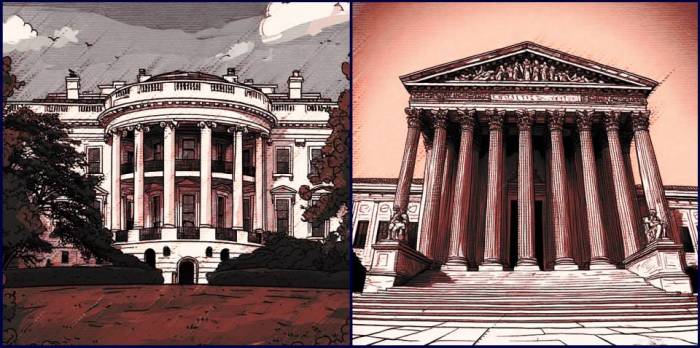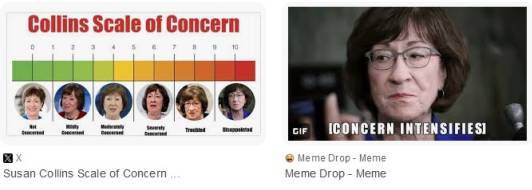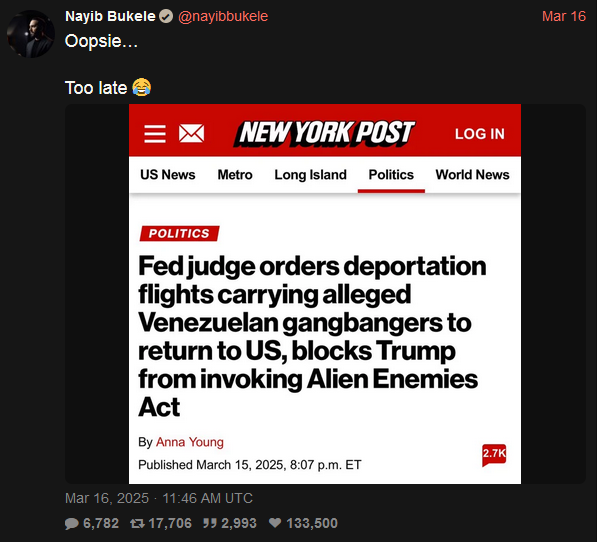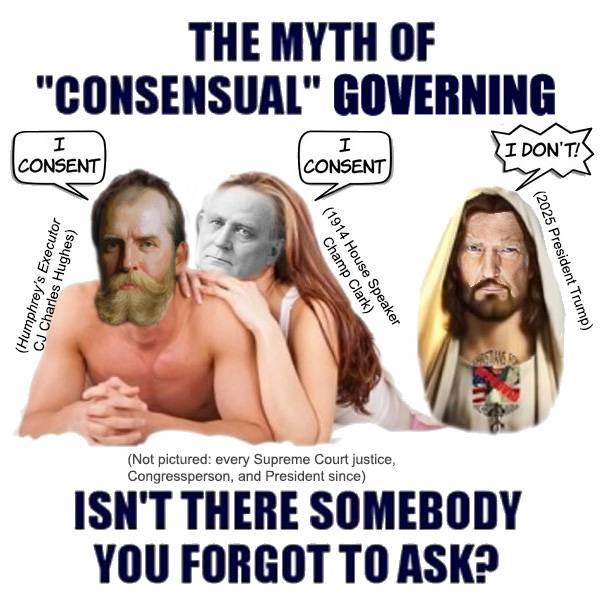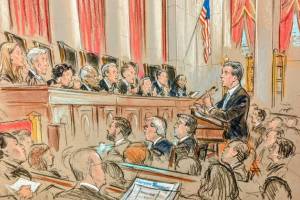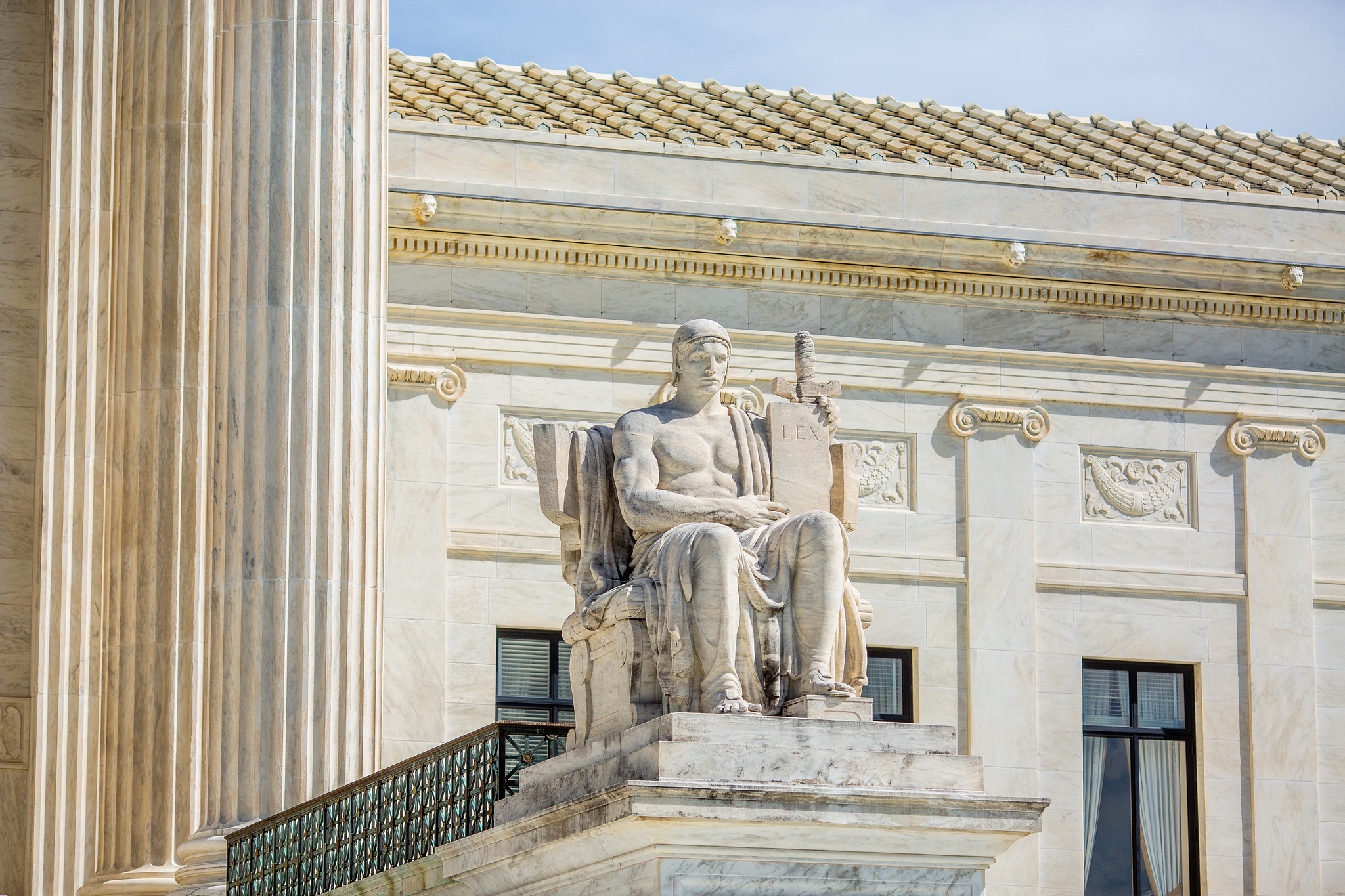On Friday,
SCOTUS issued an injunction preventing the deportation of Venezuelans under the Alien Enemies Act.
 Majority Opinion
Majority Opinion |
Accordingly, in J. G. G., this Court explained - with all nine Justices agreeing - that "AEA detainees must receive notice that they are subject to removal under the Act... within a reasonable time and in such a manner as will allow them to actually seek habeas relief" before removal. In order to "actually seek habeas relief," a detainee must have sufficient time and information to reasonably be able to contact counsel, file a petition, and pursue appropriate relief.
|
The opinion colored its rejection of the Fifth Circuit's procedural denial (of the injunction) with some
direct language about how the lower court's decision amounted to an irreversible deprival of constitutional rights.
The habeas claim returns to the Fifth Circuit with the subtext, "we know you'd try to deny it at 3am on a Sunday and the detainees would be on a plane at 3:01":
 Majority Opinion
Majority Opinion |
The Government is enjoined from removing the named plaintiffs or putative class members in this action under the AEA pending order by the Fifth Circuit and disposition of the petition for a writ of certiorari, if such writ is timely sought.
|
The bigger picture
The White House has been going buck wild with executive authority: doing tariff negotiations using war powers, slashing budgets and staff (setting up a potential impoundment crisis), and illegally replacing the heads of independent government agencies. It's the kind of brave and bold action that
SCOTUS wrote was part and parcel with the job of president, when it decided he could suffer no repercussions for things done from the Oval Office. Except perhaps some Bill Clinton things (but even then he could slow roll the trial by
claiming immunity and getting a free delay).
|
|
|
Despite losing in November, Redditors and their ilk still haven't realized that calling people Nazis only serves to alienate their own cause. |
Many have openly wondered
how the executive could accomplish this blitzkrieg reformation, sometimes announcing, "fascism is already here". It's an understandable perspective considering the president and his proxies have been vocally claiming things like, "the judiciary cannot block executive orders". But much of this has been the President creating the appearance of total authority while the courts sort through the mountain of executive actions:
- Some things are being done through war/emergency powers. These were always available to the president and it's on Congress to repeal them when they realize the executive no longer respects norms.
- Some things are on hold and working their way through federal courts. The aforementioned deporatations are one. Some layed off federal employees were reinstated because it violated worker protections.
- Other litigants have not received injunctive relief - e.g. tariffs and some personnel dismissals - but the ultimate decision is yet to be determined. Of course, in these cases the DOJ can slow roll proceedings until the damage cannot be undone.
The court system is reactionary by design, so it's premature to begin eulogizing the American democracy. That said, there are three big reasons to have Susan Collins levels of concern.
1. Courts can't take preemptive action
The expedited deportation scheme showed just how easily
the executive can exploit the latency built into even the most responsive judicial decisions. And as we found out with the planes to El Salvador, the judiciary has no power over foreign policy.
2. There are plenty of other dirty tricks
Last Thursday we heard oral arguments regarding the executive order to eliminate birthright citizenship. Like the deporation decision, SCOTUS didn't address the core issue but rather the district court injunction against the order. John Sauer
of "the president can assassinate opponents" fame argued that
nationwide injunctions shouldn't be a power of district courts (district
federal courts, mind you).
While the administration may lose on the birthright citizenship thing, it may not matter if they can convince Roberts and Barrett to disempower the lower courts:
 Slate
Slate |
I think Barrett saw that what Sauer is putting forward is fundamentally a game. It's a game where the government can keep losing, then parlay those losses into a win by keeping a case away from the Supreme Court forever. And there's nothing that binds the Justice Department to Sauer's representation that it will respect the Supreme Court. So the consequences of this argument are pretty vast. If you take away the principle that the Supreme Court's decisions are binding on everyone, and you take away the district courts' power of nationwide injunctions to ensure that everyone's rights are protected, then you have effectively taken away judicial review. And that seems to be the end goal of the Trump administration's battle in this case.
|
3. The FedSoc
Chicanery doesn't matter if the Supreme Court ultimately decides that illegal immigrants are not "subject to the jurisdiction of US law" and thereby birth stateless children. It doesn't matter if SCOTUS decides habeas corpus can be suspended because MS13 is an invading army if the President says so. It doesn't matter if Roberts and Barrett can be convinced that the Federal Reserve being an independent executive agency is unconstitutional. Or that fed whistleblowers shouldn't report fraud, waste, and abuse to an independent Office of Inspector General but rather up the chain that they're blowing the whistle on.
Alito and Thomas
Returning to the deporation/habeas thing, Alito wrote a dissent that Thomas joined. When asked the question "should we grant injunctive relief to people under threat of extrajudicial, irreversible deportation (which we know is not a hollow threat)?" these justices said, "well first, the government promised to keep the two people in question and also SCOTUS does not have jurisdiction here".
 Justice Alito
Justice Alito |
The record that was before the District Court on April 18 (which is the same record that was before us at midnight on that date) included no concrete evidence that any removals were so imminent that a ruling had to be made immediately. The applicants' factual support consisted of six sworn declarations and a photograph that the applicants asserted was an image of a notice of removal. But neither the declarations nor the photograph showed "extreme urgency."
|
What a weird hill to die on. One of the detainees told his attorney that he was informed he'd be deported that day or the following. Considering the irreversibility of such an event (as we already knew from March), it seems like having six sworn declarations should be concrete enough to hit the pause button. And clearly it was the right call:
 Majority Opinion
Majority Opinion |
Evidence now in the record (although not all before us on April 18) suggests that the Government had in fact taken steps on the afternoon of April 18 toward removing detainees under the AEA-including transporting them from their detention facility to an airport and later returning them to the facility.
|
Alito goes on to say that the government promised it wouldn't deport the two detainees in question so SCOTUS didn't need to step in. Never mind that
the majority opinion covers everyone subject to AEA deportation (Alito disagrees with this, too).
 Justice Alito
Justice Alito |
The Government had represented in District Court that it would not remove either of those men-the only parties who were indisputably before the court-while their habeas petitions were pending.
|
And even for the named detainees,
I'm not so sure they wouldn't get "oopsied":
 Justice Alito
Justice Alito |
The Government "unequivocally" told the District Court that it did not "'presently expect to remove A.A.R.P. or W.M.M. under the [Alien Enemies Act (AEA)] until after the pending habeas petition is resolved,'" and that it would " 'update' " the District Court if that changed.
|
I didn't read the government's statement but the way Alito chooses to characterize it isn't especially convincing. "Unequivocally" seems to indicate that there was an airtight promise that A.A.R.P. and W.M.M. wouldn't be deported. And yet "presently expect" is about as air tight as a screen door. Add to that the "under the AEA" qualifier and "we'll update you if it changed". Before? During? After?
Lastly, Alito doesn't think the detainees without lawyers would be successful at forming a class such that they can all get a court to explicitly tell the government to follow due process. So suddenly
access to a lawyer becomes a requirement for civil rights. Cool.
The Fifth Circuit
Judge Ho of the Fifth Circuit got on his soapbox for
the appeals court's formal acknowledgement of the SCOTUS decision. It's really just a rehash of Alito's complaints about how the request for relief didn't follow the usual timeline of the judiciary. The
reluctant concurrence makes no mention of the responsiveness required to keep pace with the deportations nor does it address the consequences of a judicial stay that comes a minute too late.
Humphrey's Executor
|
|
|
Kagan's dissent, more or less. |
Over the past century,
Congress has created a number of independent agencies that handle complex issues such as radio communications, stock markets, and consumer scams. Wisely, these agencies have bipartisan leadership that is fairly insulated from the tides of politics. The staff of these agencies are extended civil service protections (and constraints), the commissioners can only be removed by the President if they do something unambiguously wrong. This apolitical structure doesn't comport with President Trump's loyalists-only policy, so he dismissed a handful of commissioners and has threatened to remove Fed chair Jerome Powell on numerous occasions.
Lower courts correctly ruled that the dismissals run afoul of the statutory construction of the agencies as well as a prior Supreme Court decision
Humphrey's Executor v. United States, so they reinstated the MSPB and NRLB litigants. The White House responded by asking to have the resinstatements put on the SCOTUS emergency docket with the ultimate question (the constitutionality of independent agencies) to be decided at a later date.
This week SCOTUS
decided 6-3 that the greater harm would be done by keeping the imperiled commissioners in place while the process of actually reviewing
Humphrey's Executor follows the normal, lengthy process. Independent agencies and
Humphrey's Executor have been around for a century, so
it's amusing that the conservative side of SCOTUS would decide on a temporary remedity that subverts longstanding statutes, prior decisions, and the status quo. It's amusing, but unsurprising at this point.
Another strange contour of the majority opinion is that it carves out an exception for the Federal Reserve, stating only that
a distinct history/tradition separates the Fed from everyone else. No one from the FOMC has been dismissed so it seems a little like SCOTUS is trying to decide on an issue not in front of them. If you give the majority opinion the benefit of the doubt, they were simply addressing a point mentioned in briefs - that if these dismissals stand the FOMC are equally vulnerable.
If you don't grant the Roberts Court the benefit of the doubt (not exactly a fringe notion), the decision seems to indicate that
the conservative justices believe in a unitary executive... unless it's a threat to the economy. This is both a condemnation of how ideologically consistent Kavanaugh and Gorsuch are and how they clearly recognize that a loyalist FOMC would be a disaster. It sarcastically disgusts me that they would negate the will of the American people: negative interest rates and infinite QE.
The dissent
Justice Kagan wrote a dissent, joined by Justices Sotomayor and Jackson. It's not long and completely worth a read. Her obvious main question (paraphrased):
"why is the majority deciding opposite the century of agreement between all three branches of government?" She continues by highlighting the manner by which the challenge has been brought:
 Justice Kagan
Justice Kagan |
Yet here the President fired the NLRB and MSPB Commissioners in the teeth of Humphrey's, betting that this Court would acquiesce. And the majority today obliges - without so much as mentioning Humphrey's.
|
Finally,
Kagan suggests that the majority opinion seems to indicate that the conservative justices have already decided to overturn Humphrey's Executor, that the process hereafter is simply theatre.
Some posts from this site with similar content.
(and some select mainstream web). I haven't personally looked at them or checked them for quality, decency, or sanity. None of these links are promoted, sponsored, or affiliated with this site. For more information, see
.

